|
|
|
Sort Order |
|
|
|
Items / Page
|
|
|
|
|
|
|
| Srl | Item |
| 1 |
ID:
115285
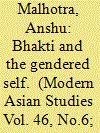

|
|
|
|
|
| Publication |
2012.
|
| Summary/Abstract |
Bhakti is viewed as a movement that is subversive of orthodoxy, and inverts the societal norms prescribed by the dharmashastras. This paper looks at the Bhakti movement's long history and transformations into the nineteenth century in Punjab. If womanly dharma within the normative tradition is defined by sexual containment through marriage and wifehood, the accumulated Bhakti legends and hagiographies are examined to see the place of the prostitute in it, and the limits of its revolutionary potential are brought to the fore. By looking at the writings of the Muslim prostitute Piro who comes to live in the establishment of a 'Sikh' guru Gulab Das, in Chathianwala near Lahore during the period of Ranjit Singh, this paper attempts to read Piro's use of Bhakti legends and imagery to build support for her unusual step. The imbrication of the Gulabdasis in hybrid practices that borrowed elements from advaita, Bhakti and Sufi theologies is also delineated. The paper shows Piro's engagement with the radical potential of Bhakti, but also maps her move towards social conformity-the paradox that makes her look at herself simultaneously as a courtesan and as a consort.
|
|
|
|
|
|
|
|
|
|
|
|
|
|
|
|
| 2 |
ID:
151478
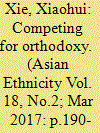

|
|
|
|
|
| Summary/Abstract |
This paper explores cultural unity and diversity in terms of the origins of orthodoxy. First, it examines the long-standing tradition of territorial kings (tuwang) in the local context – this tradition persisted even under the native chieftain (tusi) system imposed by imperial states. Secondly, it argues that the dual identities of native chieftains reflect competing claims to orthodoxy. Native chieftains derive their legitimacy not only from the state but also from their territory. To root their legitimacy in the territory itself, native chieftains emphasized their ancestors’ heroic events and their own ability as territorial kings to protect the region from invasions by other chieftains as well as the imperial state, while also stressing their ability to provide continued spiritual protection after their deaths. This paper furthermore shows that, in the process of constructing a system of ritual orthopraxy through incorporating state-promoted rituals like ancestor worship, native chieftains gained legitimacy by integrating Tujia society, on the one hand, while expanding their territories along the Western Hunan Miao frontier, on the other hand.
|
|
|
|
|
|
|
|
|
|
|
|
|
|
|
|
| 3 |
ID:
124962
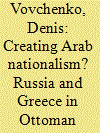

|
|
|
|
|
| Publication |
2013.
|
| Summary/Abstract |
The article discusses Russian and Greek rivalry over the influence in the Patriarchates of Jerusalem and Antioch from the end of the Egyptian occupation to the Young Turk Revolution. While Greece ultimately aimed at including Orthodox Arabs in a Pan-Hellenic nation, Russian private and state actors were motivated by the cultural and political commitment to the defence of Orthodoxy from western inroads. Throughout this period, Russian diplomats were able to continue their traditional partnership with many Ottoman Greek prelates even after the Bulgarian schism of 1872. But when their leadership seemed to be the cause of mass defections from orthodoxy, Russian foreign policy makers from local consuls to the tsar were drawn into supporting the restoration of native Arab control. The article brings fresh archival evidence to put into context the development of some of the earliest modern Arab autonomous institutions. It also contributes to the discussion of the strength of dynastic and religious identities before 1914.
|
|
|
|
|
|
|
|
|
|
|
|
|
|
|
|
| 4 |
ID:
138667
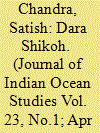

|
|
|
| 5 |
ID:
131412
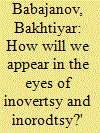

|
|
|
|
|
| Publication |
2014.
|
| Summary/Abstract |
This article offers a close reading of several unpublished manuscripts by the Russian Orientalist, administrator and missionary ideologue Nikolai Petrovich Ostroumov, who spent most of his career in the Turkestan governor-generalship. Ostroumov's violent Islamophobia and close relationship with the colonial administration support to some extent the thesis of Edward Said and other postcolonial theorists that European views of the 'Orient' were an epistemological construction of negative attributes that reflected European self-perceptions, and that academic Orientalism was often the handmaiden of colonial power and expansion. However, much of Ostroumov's writing was so abstract and divorced from the social and political realities of Turkestani society that it was of little practical use, something compounded by his view of Orthodox Christianity and Islam as polar opposites. Ostroumov's private writings reveal a deep anxiety regarding the durability of Russian conquest and rule in Central Asia, and paranoia about the decline and destruction of the Christian faith and European civilization.
|
|
|
|
|
|
|
|
|
|
|
|
|
|
|
|
| 6 |
ID:
138476
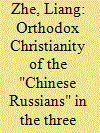

|
|
|
|
|
| Summary/Abstract |
The article describes specific features of Orthodox Christianity among the "Chinese Russians" of the Three Rivers Area (Hulunbuir, Inner Mongolia of the PRC), a half-breed ethnic group formed in Northern Manchuria, which used to be a zone of active Russo-Chinese contacts. Special attention is paid to results of researches carried out by Chinese ethnologists.
|
|
|
|
|
|
|
|
|
|
|
|
|
|
|
|
| 7 |
ID:
172931
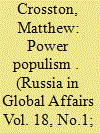

|
|
|
|
|
| Summary/Abstract |
In traditional understandings of classical populism, power is commonly
defined as being in need of devolving from the corridors of power and
out to a more grassroots foundation. At its core, populism was usually
seen as a belief in empowering regular people. ‘Regular people’ were
typically defined as being disconnected, if not outright disenfranchised,
from central power and outside the realm of the ‘elite.’ This paper
investigates the modern phenomenon in Russia and America that turns
these traditional concepts completely on their head. Rather than being
a movement engineered against elite political insiders, populism in
America and Russia currently seems to be occupied by the elites of
society. Ironically, these elites position themselves as the chosen
representatives of the disenfranchised. These strange bedfellows have
arguably produced a new form of ‘power populism’: instead of being
focused on removing power from the state, this populism is founded
more upon strengthening the global position of the state while tacitly
dismissing/attacking the perceived intellectual elite of each society.
|
|
|
|
|
|
|
|
|
|
|
|
|
|
|
|
| 8 |
ID:
185801
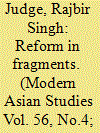

|
|
|
|
|
| Summary/Abstract |
This article rethinks how we understand religious reform under colonial rule by examining Maharaja Duleep Singh, the deposed ruler of the Sikh empire, and how the Singh Sabha, a Sikh reform movement, debated, deployed, and organized around him in the late nineteenth century. I demonstrate how religious reform was a site of intense conflict that reveals the processes of argumentation within the contours of a tradition, even as the colonial state sought to continually mediate the terms. Embedded within a frame of inquiry provided by the Sikh tradition, the contestations that constituted reform within the tradition remained intimately tied in with the question of sovereignty. Ranjit Singh's empire in Panjab had only been annexed 30 years earlier in 1849 and remained a central reference point for thinking about the political at the turn of the century. These debates surrounding Duleep Singh, therefore, disclose the contentious engagements within a tradition that cannot be reduced to binary designations such as colonial construct/indigenous inheritance or religious/political.
|
|
|
|
|
|
|
|
|
|
|
|
|
|
|
|
| 9 |
ID:
096244
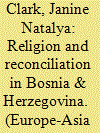

|
|
|
|
|
| Publication |
2010.
|
| Summary/Abstract |
The article explores the question of whether and how religion is being used in Bosnia & Herzegovina (BiH) to promote and foster reconciliation. Based primarily on 20 semi-structured interviews with representatives of the three main faiths in BiH-Islam, Orthodoxy and Catholicism-the article's central contention is that religion is a potentially valuable, yet fundamentally under-utilised peace-building tool in BiH.
|
|
|
|
|
|
|
|
|
|
|
|
|
|
|
|
| 10 |
ID:
134138
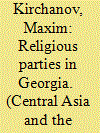

|
|
|
|
|
| Publication |
2014.
|
| Summary/Abstract |
The Georgian Apostolic Autocephalous Orthodox Church plays a significant role in the political and intellectual life of Georgian society. Religious parties are active in Georgia's political landscape. The ideologues and theorists of clerical parties are developing ideas and concepts of Georgian political nationalism and supporting the Georgian language and identity. The ideology of the clerical parties in Georgia is of a mixed nature. The religious parties are developing ideas of political traditionalism. Georgian conservative theorists also support liberal theories in the economic sphere. Political instability is promoting an increase in the moral and political authority of the Church in Georgia. The prospects for the development and transformation of clerical parties are vague and still uncertain.
|
|
|
|
|
|
|
|
|
|
|
|
|
|
|
|
|
|
|
|
|